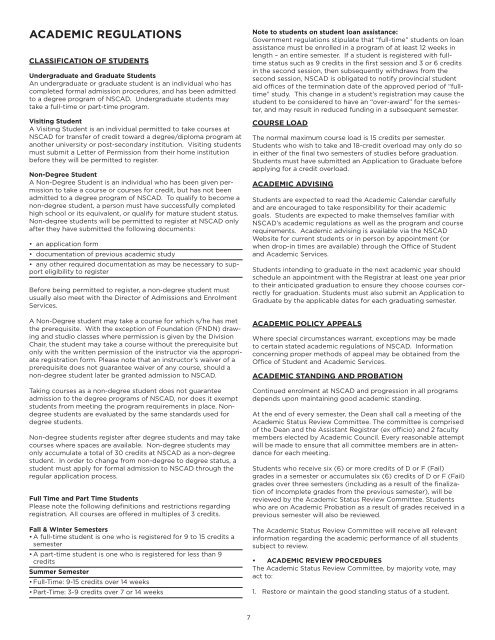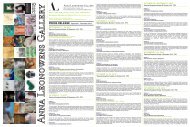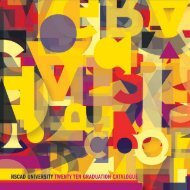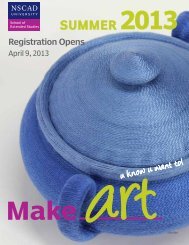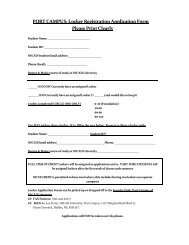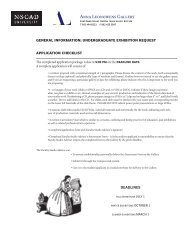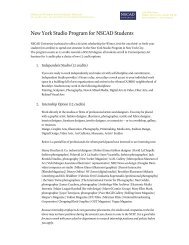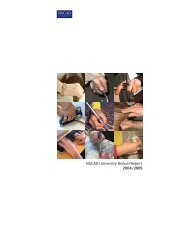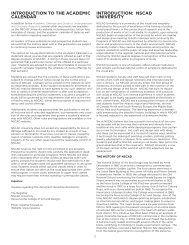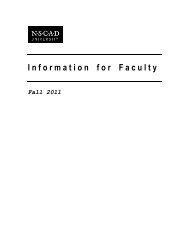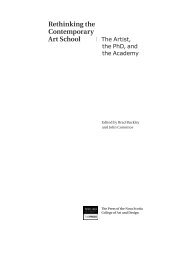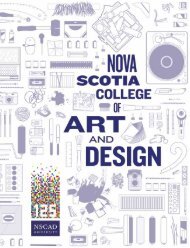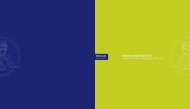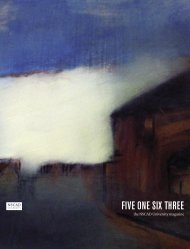CONTENTS - Nova Scotia College of Art and Design
CONTENTS - Nova Scotia College of Art and Design
CONTENTS - Nova Scotia College of Art and Design
You also want an ePaper? Increase the reach of your titles
YUMPU automatically turns print PDFs into web optimized ePapers that Google loves.
ACADEMIC REGULATIONS<br />
CLASSIFICATION OF STUDENTS<br />
Undergraduate <strong>and</strong> Graduate Students<br />
An undergraduate or graduate student is an individual who has<br />
completed formal admission procedures, <strong>and</strong> has been admitted<br />
to a degree program <strong>of</strong> NSCAD. Undergraduate students may<br />
take a full-time or part-time program.<br />
Visiting Student<br />
A Visiting Student is an individual permitted to take courses at<br />
NSCAD for transfer <strong>of</strong> credit toward a degree/diploma program at<br />
another university or post-secondary institution. Visiting students<br />
must submit a Letter <strong>of</strong> Permission from their home institution<br />
before they will be permitted to register.<br />
Non-Degree Student<br />
A Non-Degree Student is an individual who has been given permission<br />
to take a course or courses for credit, but has not been<br />
admitted to a degree program <strong>of</strong> NSCAD. To qualify to become a<br />
non-degree student, a person must have successfully completed<br />
high school or its equivalent, or qualify for mature student status.<br />
Non-degree students will be permitted to register at NSCAD only<br />
after they have submitted the following documents:<br />
• an application form<br />
• documentation <strong>of</strong> previous academic study<br />
• any other required documentation as may be necessary to support<br />
eligibility to register<br />
Before being permitted to register, a non-degree student must<br />
usually also meet with the Director <strong>of</strong> Admissions <strong>and</strong> Enrolment<br />
Services.<br />
A Non-Degree student may take a course for which s/he has met<br />
the prerequisite. With the exception <strong>of</strong> Foundation (FNDN) drawing<br />
<strong>and</strong> studio classes where permission is given by the Division<br />
Chair, the student may take a course without the prerequisite but<br />
only with the written permission <strong>of</strong> the instructor via the appropriate<br />
registration form. Please note that an instructor’s waiver <strong>of</strong> a<br />
prerequisite does not guarantee waiver <strong>of</strong> any course, should a<br />
non-degree student later be granted admission to NSCAD.<br />
Taking courses as a non-degree student does not guarantee<br />
admission to the degree programs <strong>of</strong> NSCAD, nor does it exempt<br />
students from meeting the program requirements in place. Nondegree<br />
students are evaluated by the same st<strong>and</strong>ards used for<br />
degree students.<br />
Non-degree students register after degree students <strong>and</strong> may take<br />
courses where spaces are available. Non-degree students may<br />
only accumulate a total <strong>of</strong> 30 credits at NSCAD as a non-degree<br />
student. In order to change from non-degree to degree status, a<br />
student must apply for formal admission to NSCAD through the<br />
regular application process.<br />
Full Time <strong>and</strong> Part Time Students<br />
Please note the following definitions <strong>and</strong> restrictions regarding<br />
registration. All courses are <strong>of</strong>fered in multiples <strong>of</strong> 3 credits.<br />
Fall & WInter Semesters<br />
• A full-time student is one who is registered for 9 to 15 credits a<br />
semester<br />
• A part-time student is one who is registered for less than 9<br />
credits<br />
Summer Semester<br />
• Full-Time: 9-15 credits over 14 weeks<br />
• Part-Time: 3-9 credits over 7 or 14 weeks<br />
7<br />
Note to students on student loan assistance:<br />
Government regulations stipulate that “full-time” students on loan<br />
assistance must be enrolled in a program <strong>of</strong> at least 12 weeks in<br />
length – an entire semester. If a student is registered with fulltime<br />
status such as 9 credits in the first session <strong>and</strong> 3 or 6 credits<br />
in the second session, then subsequently withdraws from the<br />
second session, NSCAD is obligated to notify provincial student<br />
aid <strong>of</strong>fices <strong>of</strong> the termination date <strong>of</strong> the approved period <strong>of</strong> “fulltime”<br />
study. This change in a student’s registration may cause the<br />
student to be considered to have an “over-award” for the semester,<br />
<strong>and</strong> may result in reduced funding in a subsequent semester.<br />
COURSE LOAD<br />
The normal maximum course load is 15 credits per semester.<br />
Students who wish to take <strong>and</strong> 18-credit overload may only do so<br />
in either <strong>of</strong> the final two semesters <strong>of</strong> studies before graduation.<br />
Students must have submitted an Application to Graduate before<br />
applying for a credit overload.<br />
ACADEMIC ADVISING<br />
Students are expected to read the Academic Calendar carefully<br />
<strong>and</strong> are encouraged to take responsibility for their academic<br />
goals. Students are expected to make themselves familiar with<br />
NSCAD’s academic regulations as well as the program <strong>and</strong> course<br />
requirements. Academic advising is available via the NSCAD<br />
Website for current students or in person by appointment (or<br />
when drop-in times are available) through the Office <strong>of</strong> Student<br />
<strong>and</strong> Academic Services.<br />
Students intending to graduate in the next academic year should<br />
schedule an appointment with the Registrar at least one year prior<br />
to their anticipated graduation to ensure they choose courses correctly<br />
for graduation. Students must also submit an Application to<br />
Graduate by the applicable dates for each graduating semester.<br />
ACADEMIC POLICY APPEALS<br />
Where special circumstances warrant, exceptions may be made<br />
to certain stated academic regulations <strong>of</strong> NSCAD. Information<br />
concerning proper methods <strong>of</strong> appeal may be obtained from the<br />
Office <strong>of</strong> Student <strong>and</strong> Academic Services.<br />
ACADEMIC STANDING AND PROBATION<br />
Continued enrolment at NSCAD <strong>and</strong> progression in all programs<br />
depends upon maintaining good academic st<strong>and</strong>ing.<br />
At the end <strong>of</strong> every semester, the Dean shall call a meeting <strong>of</strong> the<br />
Academic Status Review Committee. The committee is comprised<br />
<strong>of</strong> the Dean <strong>and</strong> the Assistant Registrar (ex <strong>of</strong>ficio) <strong>and</strong> 2 faculty<br />
members elected by Academic Council. Every reasonable attempt<br />
will be made to ensure that all committee members are in attendance<br />
for each meeting.<br />
Students who receive six (6) or more credits <strong>of</strong> D or F (Fail)<br />
grades in a semester or accumulates six (6) credits <strong>of</strong> D or F (Fail)<br />
grades over three semesters (including as a result <strong>of</strong> the finalization<br />
<strong>of</strong> Incomplete grades from the previous semester), will be<br />
reviewed by the Academic Status Review Committee. Students<br />
who are on Academic Probation as a result <strong>of</strong> grades received in a<br />
previous semester will also be reviewed.<br />
The Academic Status Review Committee will receive all relevant<br />
information regarding the academic performance <strong>of</strong> all students<br />
subject to review.<br />
• ACADEMIC REVIEW PROCEDURES<br />
The Academic Status Review Committee, by majority vote, may<br />
act to:<br />
1. Restore or maintain the good st<strong>and</strong>ing status <strong>of</strong> a student.


